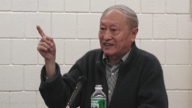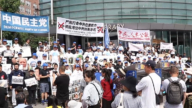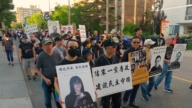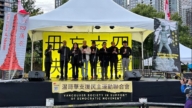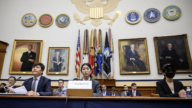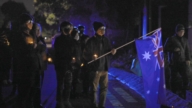【新唐人2013年04月17日讯】前中共总书记胡耀邦逝世24周年,中共高调报导,被外界看作有可能是“平反六四”的前兆。不过,与胡耀邦捆绑出现的“六四”问题,以及因为同情学生而下台的中共前总书记赵紫阳,中共却都避而不谈。有学者认为,如果以此推断中共当局会平反六四,未免太过一厢情愿。
4月15号,中共各大媒体由原来的悄然无声,突然改变为大张旗鼓的高调纪念胡耀邦逝世24周年,同时以胡耀邦倡导民主与开放为噱头,发表文章猛唱赞歌。
于是外界开始猜测,中共当局是否有意平反“六四”。
“六四”学生领袖郑存柱表示,平反六四有助于中国和平的转型,但这只是个遥不可及的愿望,实现的机会太渺小。
“六四”学生领袖郑存柱:“当年的决策者,像李鹏、或当年的受益人像江泽民,他们虽然已经退休了,但是他们在中国的政治环境里面,他们还是有他们的影响力在,所以我想平反六四的可能性不会太大。”
1989年,主张温和处理“六四事件”的时任中共总书记赵紫阳,因为反对武力镇压,招来邓小平、李鹏等人的强烈不满。随后的中共党内会议,赵紫阳被撤销了一切职务,并遭到长达15年的软禁,直到2005年1月逝世。迄今还背着“支持动乱”和“分裂党”的罪名,连骨灰安放问题也未解决。
而曾经对赵紫阳极为恭敬的时任上海市委书记江泽民,却因为积极支持镇压六四的政策,被扶持为接替赵紫阳的新一任中共总书记,成为六四事件的最大受益者。
在英国前首相撒切尔夫人逝世后,央视在回顾中英签署联合声明的报导中,也刻意屏蔽了作为中方代表的赵紫阳。
中共喉舌媒体新华网、人民网、《解放日报》、《中国新闻周刊》等,虽然先后以组图或长文表达对胡耀邦的纪念之意,但面对与胡耀邦捆绑出现的“六四”问题,包括赵紫阳三个字,都避而不谈。
赵紫阳智囊姚监复表示,六四平反只是一个美丽的幻想,永远不可能实现。
赵紫阳智囊姚监复:“现在的领导人,因为他们是六四以后上台的,江泽民和他的接班人,你要给六四平反,就等于要他们承认上台是非法的,是政变以后上台的,和政变上台领导人的继承人,所以不可能给六四平反。”
曾经担任陕西电视台编辑工作的马晓明,因为参与了八九年的示威活动,被免去职务。马晓明始终反对提出“平反六四”的口号,他认为,屠杀人民的刽子手,无权对受害的人民进行平反,它只能得到人民和历史的审判。
另外,有香港媒体分析,胡耀邦、赵紫阳是中共的开明派、改革派,尽管他们在任时推动改革开放,但始终未触及放弃中共一党专政的核心问题,目的只在于加强和改善中共的领导地位。
采访/陈汉 编辑/黄亿美 后制/郭敬
It is difficult for Chinese regime to vindicate June 4
The Chinese Communist Party (CCP) provided high-profile
reports for the 24th anniversary of the death of Hu Yaobang, a former Party leader.
Observers thought that these reports might’ve been the
precursor to the vindication of the June 4 incident (6/4).
However, Hu Yaobang was tied to the June 4 incident,
and Zhao Ziyang was forced to step down for being a 6/4 sympathizer, but the CCP has evaded these issues.
Therefore, some scholars conclude that vindication of 6/4
is only wishful thinking.
On April 15, the silent CCP’s major media suddenly published
high-profile articles to commemorate the death of Hu Yaobang.
At the same time, they praised Hu for advocating democracy.
So, the outside world began to speculate whether
the authorities intend to vindicate 6/4.
6/4 student leader Cheng Cunzhu believes that vindication
of June 4 will be helpful for China’s peaceful transition.
Yet, this is such a distant dream that
its becoming a reality is too insignificant.
Zheng Cunzhu: “The decision-makers in 1989,
such as Li Peng, and Jiang Zemin, are still alive.
Although they have retired, they are quite influential
inside China’s political environment.
So, I think the possibility of vindication of 6/4 is very slim.”
In 1989, the CCP General Secretary Zhao Ziyang opposed
the crackdown of 6/4 incident, causing strong resentment from Deng Xiaoping and Li Peng.
Zhao was removed from all his posts and was put under
house arrest for 15 years, until his death in January 2005.
Zhao was accused of supporting unrest
and splitting the party.
Where to place Zhao’s ashes is still
an unresolved issue.
Jiang Zemin, the Shanghai Party Secretary in 1989,
was the biggest beneficiary of the June 4th incident.
Jiang was once quite respectful to Zhao, but his strong
support of the student crackdown made him Zhao’s successor.
After the death of Margaret Thatcher, the former British Prime
Minister, the CCTV reported a Sino-British Joint Statement.
It had been signed by Thatcher and Zhao Ziyang,
but Zhao’s name was deliberately shielded.
The CCP’s mouthpiece media Xinhua, People’s Daily,
Liberation Daily, and China News Weekly all published articles with photos to commemorate Hu Yaobang.
However, words like 6/4 and Zhao Ziyang were avoided.
Yao Jianfu, Zhao Ziyang’s think tank, believes that vindication
of 6/4 is only a beautiful dream, which will never become reality.
Yao Jianfu: “Today’s leaders took office after 6/4.
Vindication of 6/4 is tantamount to admitting their power
being illegal, their power coming from a political coup.
They were heirs after a political coup,
so it is impossible for them to vindicate 6/4.”
Ma Xiaoming, the former Shaanxi TV editor, was dismissed
from his post for taking part in 1989 protesting activities.
Ma has consistently opposed talk of 6/4 vindication.
Ma believes that the executioners of the people have no right
to redress 6/4, and they can only be judged by the people and history.
According to the Hong Kong media analysis, leaders like
Hu Yaobang and Zhao Ziyang were the CCP’s liberal reformists.
Even though they promoted reform and opening up while
in office, they did not touch or abandon the core issue—the CCP’s one-party dictatorship.
Their goal was to strengthen and improve the
leadership position of the CCP.


